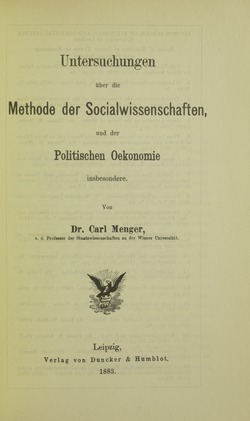History
Background
The Historical School contended that economists could develop new and better social laws from the collection and study of statistics and historical materials, and distrusted theories not derived from historical experience. Thus, the German Historical School focused on specific dynamic institutions as the largest variable in changes in political economy. The Historical School were themselves reacting against materialist determinism, the idea that human action could, and would (once science advanced enough), be explained as physical and chemical reactions. [1]
The Austrian School, beginning with the work of Carl Menger in the 1860s, argued against this (in Grundsätze der Volkswirtschaftslehre, English title: Principles of Economics ), that economics was the work of philosophical logic and could only ever be about developing rules from first principles—seeing human motives and social interaction as far too complex to be amenable to statistical analysis—and purporting to deduce universally valid precepts from human actions.[ citation needed ]
Menger and the German Historical School

The first move was when Carl Menger attacked Schmoller and the German Historical School, in his 1883 book Investigations into the Method of the Social Sciences, with Special Reference to Political Economics (Untersuchungen über die Methode der Socialwissenschaften, und der politischen Ökonomie insbesondere). Menger thought the best method of studying economics was through reason and finding general theories which applied to broad areas. Menger, as did the other Austrians, concentrated upon the subjective, atomistic nature of economics. He argued that the foundations for economics were built upon assumption of self-interest, evaluation on the margin, and incomplete knowledge. He said aggregative, collective ideas could not have adequate foundation unless they rested upon individual components.[ citation needed ]
The direct attack on the German Historical School lead Schmoller to respond quickly with an unfavourable and quite hostile review of Menger's book. [2] Menger accepted the challenge and replied in a passionate pamphlet, [3] written in the form of letters to a friend, in which he (according to Hayek) "ruthlessly demolished Schmoller's position". The encounter between the masters was soon imitated by their disciples. A degree of hostility not often equaled in scientific controversy developed. [4]